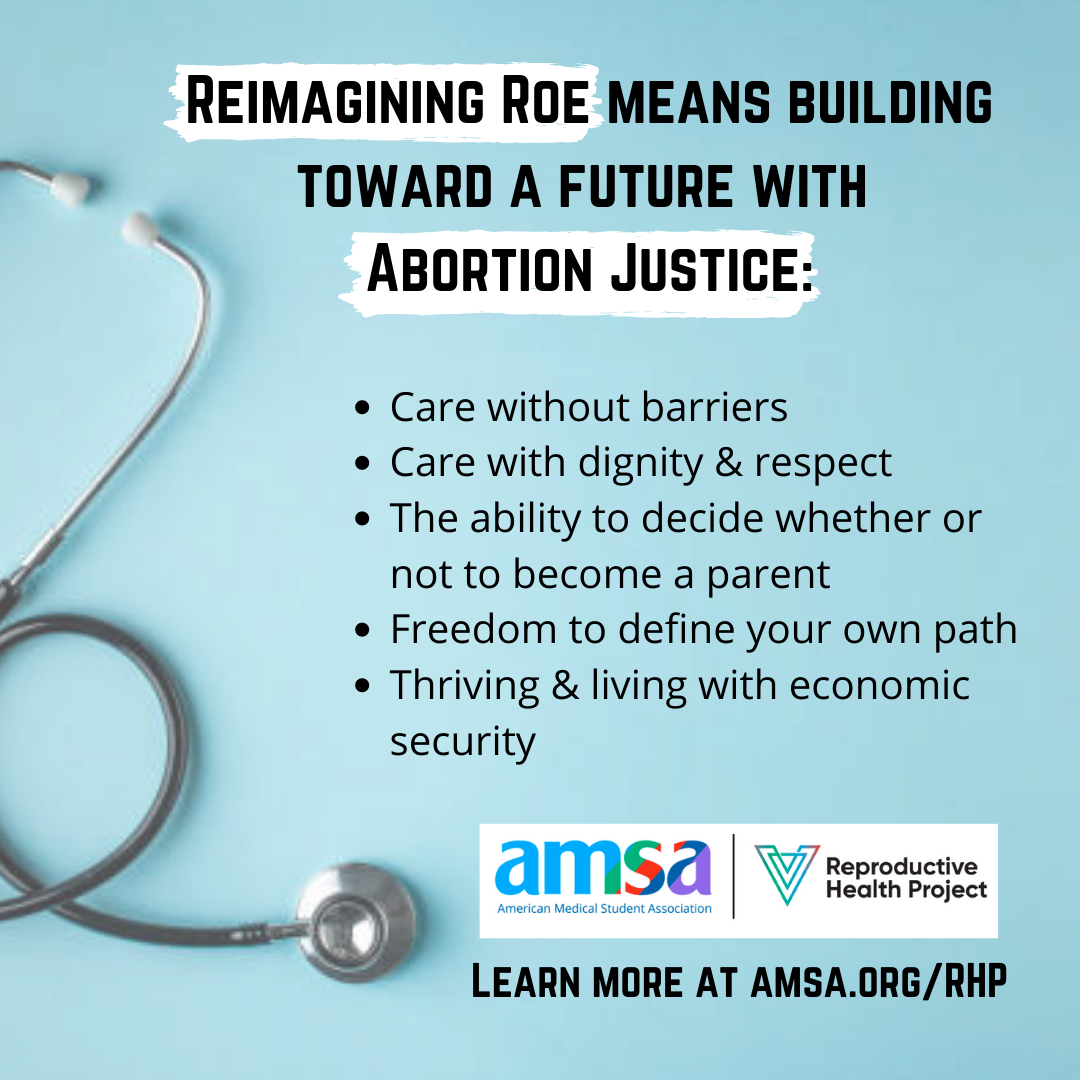On the 48th Anniversary of Roe v. Wade, we join with reproductive health professionals, advocates and activists in “reimagining Roe”: from Abortion Rights to Abortion Justice. Written by Jeff Koetje, MD, AMSA Reproductive Health Programming Strategist.
Today we observe the 48th anniversary of the landmark US Supreme Court decision in Roe v. Wade which affirmed that the right to have an abortion was implicit in the right to privacy protected by the 14th Amendment, striking down a Texas statute banning abortion and effectively legalizing abortion across all 50 states. In the nearly 50 years since, there has been a constant struggle to ensure that the Constitutional right to have an abortion translates to an actual ability to access abortion care whenever and wherever needed.

Now, in 2021, we face the reality that over the past 20 years, state and federal courts, including the US Supreme Court have been packed with rightwing judges who are openly hostile to the notion of a right to abortion, and – in truth – hostile to the very notion of a right to privacy, upon which the right to abortion has precariously rested since the 1973 decision.
Precariously, indeed. But that ought not actually be all that surprising – frustrating, sure – but not all that surprising, given that the right to abortion is predicated on (derived from) a notion of a constitutional right to privacy, which itself is not directly expressed in the US Constitution, but which is interpretively derived from several of the Constitutional amendments including the 4th, 5th, 9th, and 14th. It’s an extraordinarily visible “tell” revealing the inner psycho-sexual-socio-political machinations of a legal system that never considered women – or anyone other than the 18th Century property-owning white man and his male heirs – as full and fully legitimate citizen-subjects worthy unto themselves of the rights, privileges, and protections named or implied in our country’s founding documents. And since the 1973 ruling, we have engaged in a society-wide tug-of-war centered over the question of “To what extent, to what limits, privacy?” a back-and-forth struggle that largely serves as a clear-as-mud distraction from the actual fact that this question doesn’t even have relevance to so many people – largely Indigenous, Black, brown, poor, undocumented, LGBTQ+ people – whose lived experiences demonstrate quite clearly that a so-called “right” (whether to privacy or to abortion care) becomes effectively meaningless when countless barriers keep them from exercising that right.
So, now that we have witnessed nearly 48 years of state-level and federal-level attempts to roll back the right to (privately) seek abortion care finally recognized in 1973’s decision, we ask ourselves, along with those who have been asking this question for far longer than 48 years, how do we expand our moral vision from the now-receding horizon of abortion (privacy) rights to the now-before-us horizon of abortion justice and, more broadly, reproductive justice?
At AMSA, we affirm reproductive health services are essential to comprehensive health care, and we support full access to the entire range of reproductive services. We believe legal, safe, voluntary abortions should be available to all who need them, and that both UME (medical school) and GME (residency – especially family medicine and obstetrics/gynecology) programs should offer abortion education and training.
The AMSA Reproductive Health Project works with AMSA members, chapters, alumni, and allies to advance these commitments, and ensure a diverse physician workforce that includes highly skilled, culturally competent physicians prepared to provide abortion services to those who need them in various health care workplaces.
Our nation’s medical schools and residency programs, serving as the educational and training pipeline for our nation’s physicians, are duty-bound and accountable to meeting the health needs of all people and communities that constitute our society; this is the nature of the social contract that exists (formally and informally) between the profession of medicine and our society. And yet, for far too long, academic medical centers have centered, represented, and advanced the vested interests of an exceedingly narrow – and ever narrowing – slice of this society: the dominant, normative white holders of heteropatriarchal sociopolitical and economic power, privilege, and platform. And nowhere is this more evident than in the state of Sexual and Reproductive Health (SRH) medical education, especially in the inexcusable exclusion of abortion care education and training for medical students and residents. Several surveys of SRH med ed curricula, including a longitudinal study spanning 2005 – 2015 conducted by Medical Students For Choice (not yet published), show that only about one-fifth to one-half of medical schools include some topics related to abortion care in their curricula or offer abortion care experiences as part of the 3rd year ob/gyn rotation.
Once again, this deplorable state of neglect, disregard, minimization, and even outright hostility toward SRH med ed within our own academic medical centers is frustrating, but is not surprising, when we take account of the history of the professionalization of medicine and medical education in the US context of systemic racism and sexism and understand, for example, that within ten years of its formation the American Medical Association (AMA) initiated an anti-abortion campaign in 1857, motivated by the self-serving interests of white male doctors to eliminate the midwives’ “competition” for business related to pregnancy and delivery management. What better way to undercut the midwives than to cynically demonize abortion care and those who had traditionally provided it?
So, now in 2021, at a moment when both the right to have an abortion and the ability to exercise that right are more at risk now than at any point since 1973, how is AMSA contributing to the expansion of a moral vision for holistic reproductive healthcare that includes abortion care, not as an exceptional aspect of reproductive care, but as an aspect of whole-person care that is entirely unexceptional? How is AMSA contributing to the evolution of abortion care advocacy with an expanded moral horizon that envisions abortion justice as one part – but just one part – of reproductive justice?
As an organization dedicated to a mission of serving society by supporting the intellectual, spiritual, and ethical growth and development of this nation’s future physicians, we have a fairly straightforward theory of change. Recognizing that we need a physician workforce well educated, trained, and prepared to provide patient-centered, reproductive-justice-informed care, including abortion care, then it’s a matter of seeing and recognizing where formal medical education (UME and GME) has failed to consider critical perspectives outside of its own vested interests; has failed to honor and incorporate the knowledge, wisdom, and lived experiences of those for whom the paradigms of reproductive “rights” and “choice” have proven to be inadequate or irrelevant to contexts made complex by social forces of inequality, inequity, and injustice; has failed to live up to its own professed ethical commitments of non-maleficence and beneficence. Where formal medical education has failed and continues to fail both students and society, AMSA and other organizations such as Medical Students for Choice, step into the gap and in creative partnerships with activists and advocates for racial, gender, and economic justice, we cultivate the conditions – the pedagogies and the curricula – for liberatory education. Because, after all, no one is denying the existence of pervasive social ills, but so far, not many of our medical schools have gone so far as to embrace the notion that medical education needs to be radically reoriented toward social transformation, not accommodation, and that requires a radically different kind of physician – the physician-advocate.
Learn more about the AMSA Reproductive Health Project at AMSA.org/rhp

